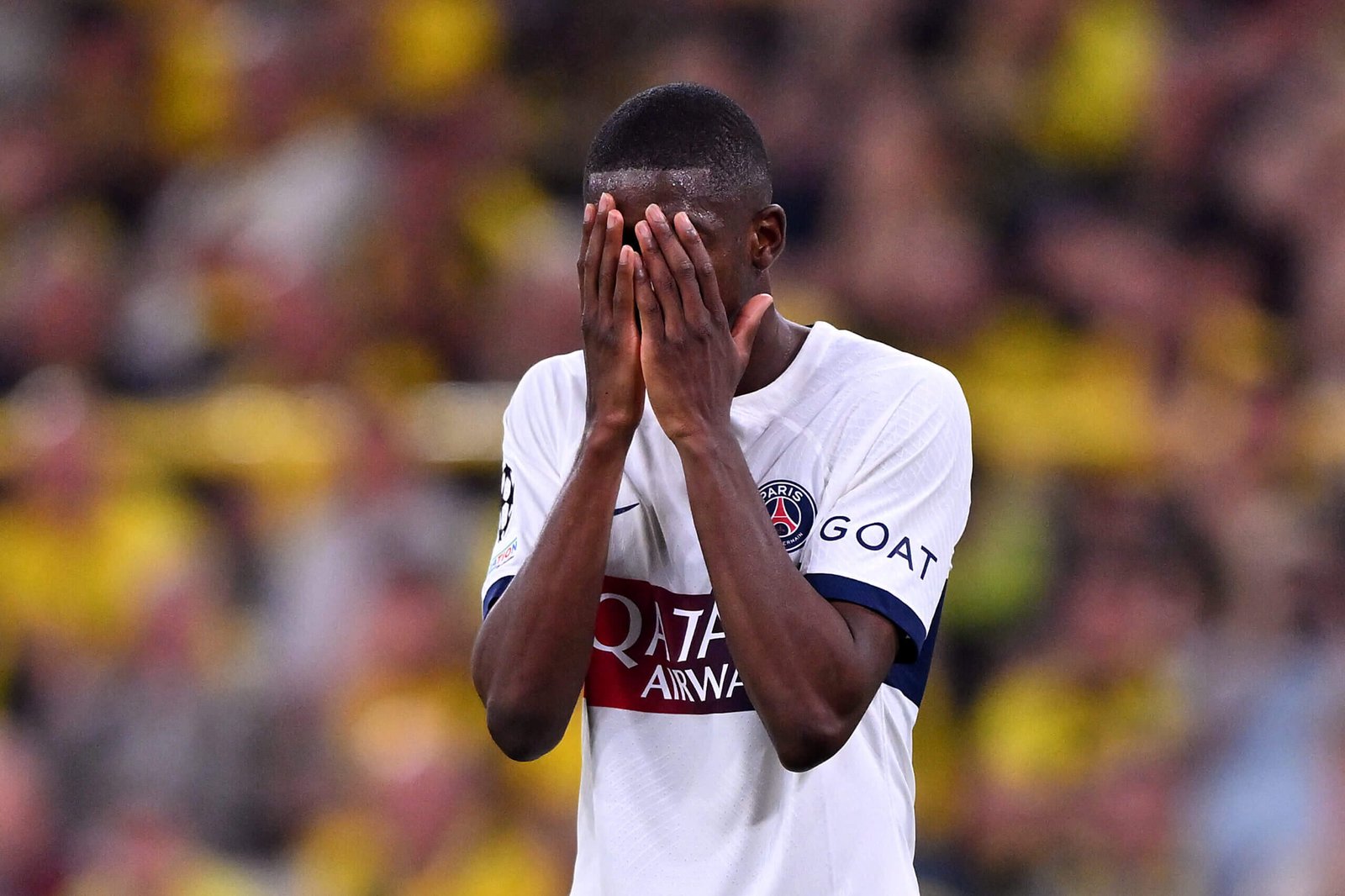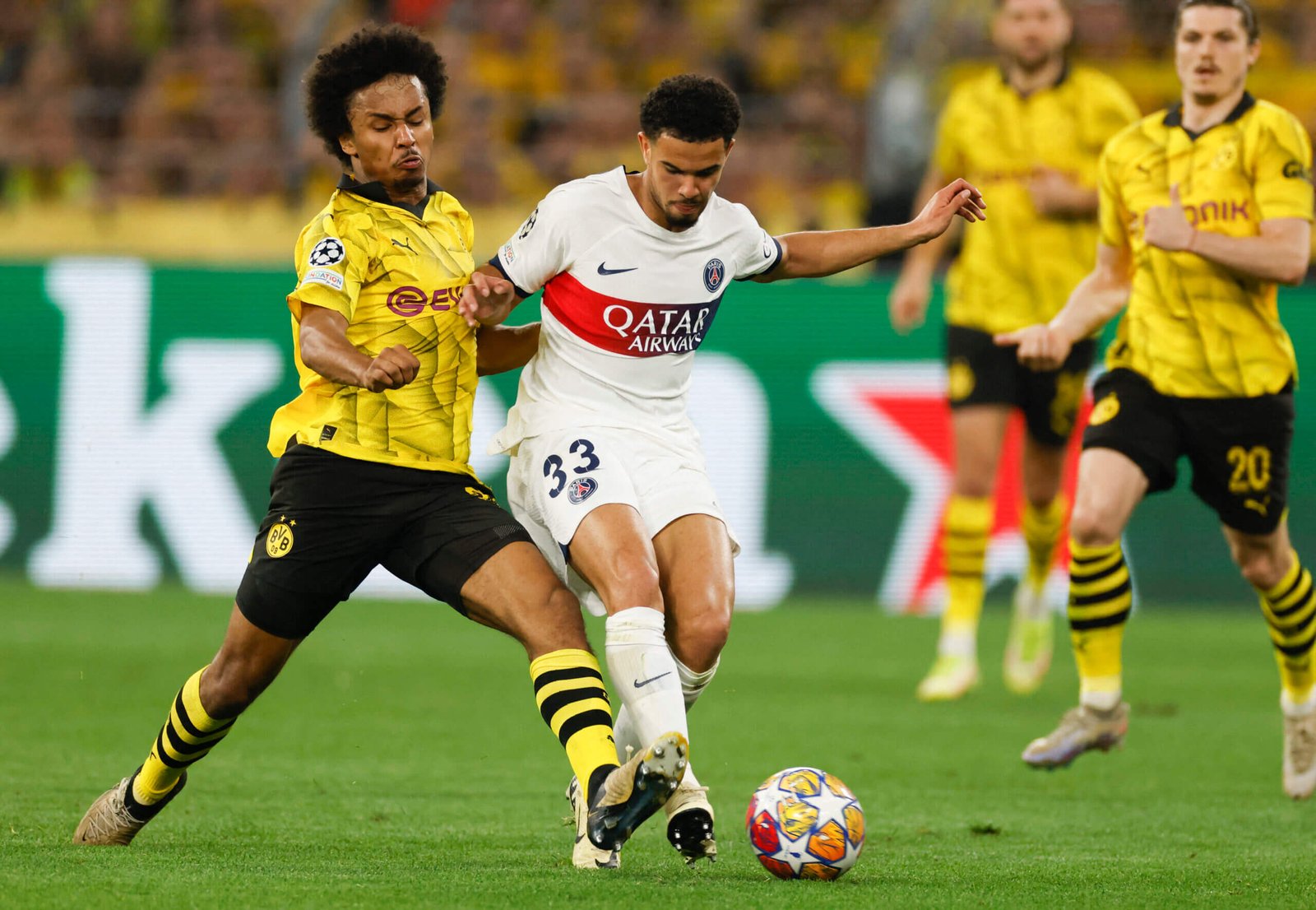This was meant to be Kylian Mbappe’s stage. Instead it was journeyman striker Niclas Fullkrug who proved the difference to give Borussia Dortmund a slender advantage in their semi-final with Paris Saint-Germain.
The 31-year-old is in the form of his life after spending the majority of it in the second tier in Germany and is now a regular scorer for the national team.
After Bayern Munich’s thrilling 2-2 draw with Real Madrid on Tuesday night, this was a much tighter first leg, particularly in the first period. That was until Dortmund went direct to Fullkrug, who produced a brilliant first touch before firing low beyond Gianluigi Donnarumma in the 36th minute.
PSG improved after the break, with Kylian Mbappe and Achraf Hakimi hitting the post within the space of 10 seconds and Ousmane Dembele blazing over in the final 10 minutes. Fullkrug should have added a second too but it is Dortmund who will head to Paris with a vital goal.
The Athletic’s Peter Rutzler, Seb Stafford-Bloor, Thom Harris and Elias Burke analyse the action.
Functional Fullkrug is flying in Champions League
Just under two years ago, Niclas Fullkrug poked home his 19th goal of the season to spark wild celebrations in Bremen. It sealed a crucial final-day win, and moved the 29-year-old up to fourth place in the goalscoring standings — in the German second tier.
He has always been a proficient striker through the divisions, a functional target man and battering ram at the top of five different teams. But since Fullkrug has turned 30, he has won a Bundesliga Golden Boot, made his international debut, scored 11 international goals — including two at the World Cup — and put his new side in the driving seat for a Champions League semi-final.
Fullkrug hammers home the opening goal (Franck Fife/AFP/Getty Images)
Fullkrug is unfashionable, but undoubtedly effective. He can sometimes struggle to get into games — he touched the ball just nine times in a cagey opening half an hour here — but his emphatic ability to smash the ball on either foot can blow games apart. It was a crisp left-footed strike to open the scoring, but as his shot map below illustrates, he is a striker who can make the most of any penalty-box situation.

He should have added a second after the break but it was heartening to see a distinctly normal footballer take centre stage.
Niclas Füllkrug’s Champions League goal involvements this season:
⚽️ vs Newcastle @ Signal Iduna Park
🅰️ vs PSG @ Signal Iduna Park
🅰️ vs PSV @ Signal Iduna Park
⚽️+🅰️ vs Atletico Madrid @ Signal Iduna Park
⚽️ vs PSG @ Signal Iduna ParkHome sweet home🏡
— Opta Analyst (@OptaAnalyst) May 1, 2024
Thom Harris
Why do PSG struggle with long balls?
Across both legs of PSG’s quarter-final victory over Barcelona, they struggled with the long ball. PSG are one of the most aggressive pressers in this year’s Champions League — no team has regained the ball quicker (judged by the opposition passes per defensive action) — but that can leave space in behind if their first press, from those forward line, is not sharp or precise.
Xavi recognised this and used Robert Lewandowski as his out ball. Marc-Andre ter Stegen, the Barcelona goalkeeper, played the majority of his passes up the field to the Poland striker, and he in turn was able to bring his wide players into play. PSG defender Lucas Beraldo had a particularly difficult game, losing five duels.
Dortmund clearly learned from those matches. Edin Terzic, the Dortmund coach, was able to use Fullkrug in a similar manner. There were early warning signs; Marcel Sabitzer made a curved run from the right to reach a long pass from Ian Maatsen, but the pass was misplaced.
Dortmund were not as precise as Barcelona in the opening stages, often wayward in their attempts to pick out Fullkrug, who in turn could not contest the aerial duel against the PSG defence. But then, Dortmund got one right. Nico Schlotterbeck sold Mbappe a dummy, and used that extra second of space to arrow a ball over the top of the PSG back line.
It was an incredibly simple goal to concede but one that proves PSG are vulnerable. They struggled with their first pressure, allowing Dortmund to play out through Julian Ryerson or allowing the time to arrow a direct pass accurately, which is exactly what happened with the opening goal.
The back line switched off and were caught flat-footed; they were not set to deal with a run in behind, expecting a pass to instead be played onto Fullkrug’s head — normally his main strength. PSG may be better pressers, but simple mistakes are still undermining that.
Peter Rutzler
Is Sancho back to his best?
Sancho’s performance was a reminder of how important environment is for footballers. He has not blazed through the Bundesliga since returning but he has seemed far less inhibited in Germany. Far away from the stifling commentary surrounding his Manchester United career, the expression has returned to his game and the timing and smart decisions that once accented his talent have returned.
They were prominent again. At his best, there is a waspishness to Sancho’s attacking play, which sees him flutter in and out of the attack and influence the game with little touches and tricks across the width of the pitch.
In the first half, he touched the ball more than any other Dortmund player, which described his appetite for the occasion and how difficult PSG found it to keep hold of him.

Sancho’s dribbling came to the fore in the first period (Franck Fife/AFP/Getty Images)
He completed seven dribbles in the first 45 minutes, too. More than any player in any Champions League game this season. More than he managed in any Manchester United game he took part in.
But on a night when Dortmund needed their crowd, the Westfalenstadion responded to his confidence and his little moments of flare. This was Sancho at his very best. It was him as a spectacle again and after what seems like a very long time, it’s nice to be able to write that again.
Seb Stafford-Bloor
How costly will PSG’s misses prove?
When Mbappe faced up his full-back a few minutes into the second half, it looked as though he would put PSG back on level terms from an acute angle.
As it transpired, his right-footed curling effort towards Gregor Kobel’s left-hand post did not curl enough and hit the post. Minutes later, Marquinhos curled a cross that dropped perfectly between Kobel and the Dortmund defensive line, with Marco Fabian ghosting in. Six yards from goal, it seemed certain he would head in from close range and put PSG on level terms. Somehow, he missed. And missed chances proved to be the story of PSG’s second half.
Mbappe was involved again in the 70th minute, receiving the ball in the same top right-hand corner of the Dortmund box that he almost scored from 20 minutes earlier. This time, he slipped in Dembele, whose tame effort was saved by Kobel. Ten minutes later, he would have the chance to redeem himself after Achraf Hakimi spotted his deep run into the box and played a pass across the box, but his right-footed shot ballooned over the crossbar.

Dembele after his miss (Oliver Hardt – UEFA/UEFA via Getty Images)
“How the French haven’t scored, I can’t believe, frankly,” said Ally McCoist, the co-commentator for TNT Sports, the UK broadcaster of the Champions League.
Fortunately for Luis Enrique, Dortmund could not make the most of several excellent second-half goalscoring opportunities. Shooting practice will surely be on the agenda ahead of next week’s second leg.
Elias Burke
Did hard-working Adeyemi silence critics?
Of all the factors expected to influence this game, Karim Adeyemi’s work without the ball was not among them. Adeyemi has suffered a bad month. From the high of his goal against Bayern Munich in March, his form has plateaued. A silly red card against Borussia Monchengladbach rightly provoked criticism and drew mutterings about his attitude. His stock has not been high.
But what a response this was. Adeyemi’s speed is typically an asset in attack. This evening it was virtue in defence, as he worked as hard as he probably ever has in Dortmund yellow to protect Ian Maatsen, his full-back, from the menacing Dembele-Hakimi threat down the PSG right.

Adeyemi was effective in defence as well as attack (ODD ANDERSEN/AFP via Getty Images)
The 70 yards he ran in the first half to chase down Hakimi and end a counter-attack was particularly stirring. He did exactly the same thing in the second half and that was typical of Adeyemi’s night. It was also emblematic of an astute and tactically aware performance in which he gave absolutely everything to prevent Dortmund’s cracks from showing.
Praise is due for Terzic, too. Adeyemi was part of a gameplan in that part of the pitch that worked really well.
Sebastian Stafford-Bloor
What did Terzic say?
“It was a well-deserved win, a good team performance,” he told DAZN. “We could have scored more goals, but so could they. That’s why the result is OK from my point of view.
“We ran a lot, but that’s necessary in a game like this. You have to earn your way to Wembley. All we need now is a draw in the second leg, but we also want to win next week. We have a small lead and a good opportunity. We don’t have fear. We know the quality of Paris.
“Sancho was extraordinary but we have seen it often training. He translates it onto the pitch. He has quality, we know his quality. It wasn’t just him, and it was important for a good match.”
What did Luis Enrique say?
“Everybody knew that this wasn’t going to be easy. This is the semi-final of the Champions League. The dressing room is a bit down, especially after hitting the post twice. But we had our supporters pushing us on throughout the match. We must recognise that this is an exceptional stadium, with fans who know how to support their team.
“We lacked incision in the final third. We didn’t create a lot more than the opponent, we looked for transitions and counter attacks. The mindset was better in the second half. It’s an opponent at a very good level and we created good chances.
“Both teams created a lot of opportunities. But they scored, and we didn’t. The result reflects how close the game was. It’s a new situation for both teams. In the last two rounds, they had the home game as their second game, whereas it was the other way round for us. We’ll now have the crowd on our side in the second leg. We’ll have to be more effective there.”
Recommended reading
(ODD ANDERSEN/AFP via Getty Images))
Read the full article here


